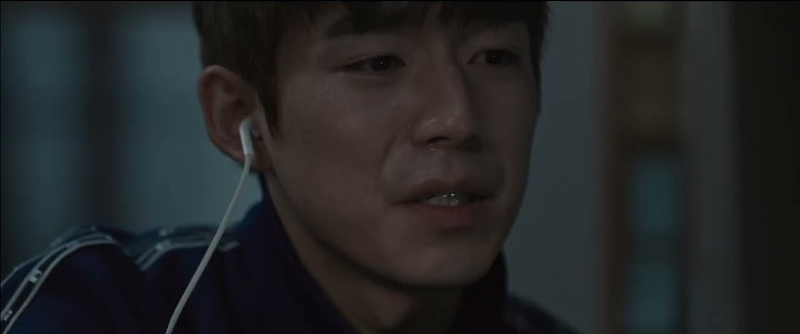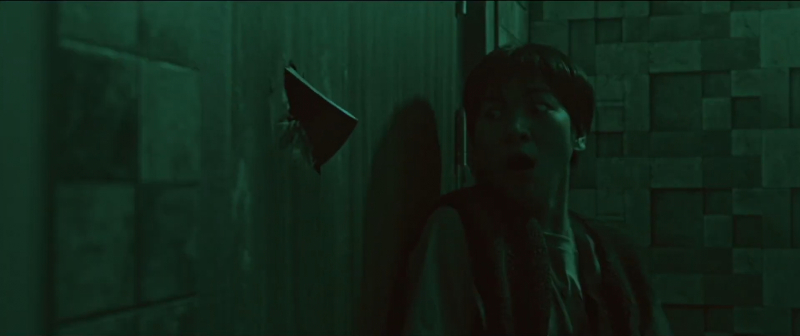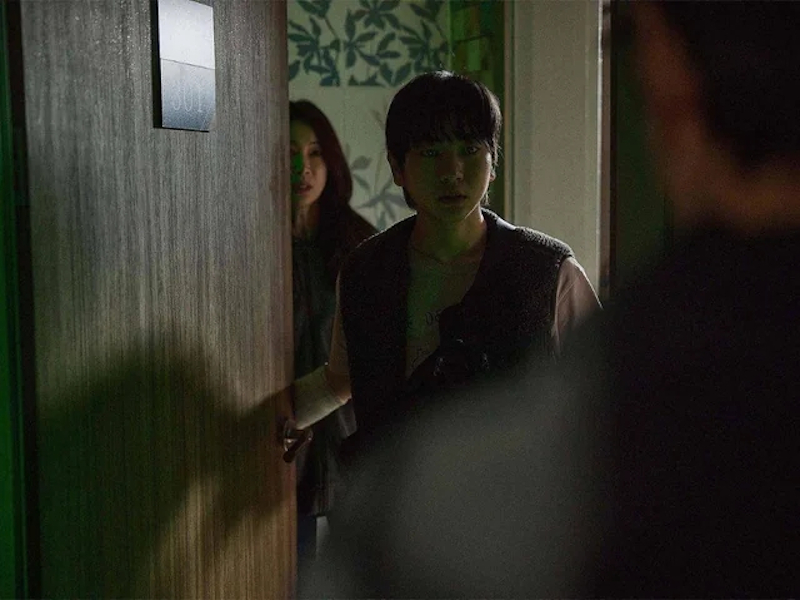Director – Yeon Je-gwang – 2023 – South Korea – LKFF Cert. 18 – 77m
***
An out-of-the-way motel, with numerous hidden cameras covertly recording the unwitting guests, becomes the site of multiple killings – from LKFF, the London Korean Film Festival 2024 which runs in cinemas from Friday, November 1st to Wednesday, November 13th
There’s an idea that the widespread presence of security cameras make the world a safer place, because things can be seen rather than hidden; equally, however, things can be recorded, turned into product and sold for profit. The Guest takes place in a familiar world of roads and car journeys and motels in the middle of nowhere at which the traveller can take a break. And all of it seems to be covered by security cameras.
That applies to the roads, where the cams are there for traffic enforcement (and, perhaps more pertinently, traffic tax raising or penalty charging) purposes. Why they are there, for good or ill, isn’t really discussed here. But their ubiquitous presence is inescapably noted.

It also applies in the seedy motel at the centre of this horror / drama / suspense / thriller. The loan shark Deuk-chan (Hyun Bong-sik) who owns the place employs two young staff members Min-cheol (Lee Joo-seung) and Young-gyu (Han Min) to run the place in a day-to-day basis both of whom are indebted to him and therefore have little choice other than to do whatever he asks, however unreasonable. So he has them install security cameras everywhere, set up to record computer video files of everything that happens in the rooms from multiple angles. Footage of unwitting occupants engaging in sex can thus be pasted up on the internet as a source of additional profit.
(In 2019, South Korea had a hotel spycam scandal, where cameras were placed in hotel rooms and guests’ activities live-streamed over the internet. This is indicative of the country’s larger cam epidemic, with the cams placed in and to livestream from largely in female public lavatories or store changing rooms, and a female police task force now set up to deal with the crime. The cams in the film aren’t gender-targeted or live-streaming, but the set-up has a worrying basis in reality that goes far beyond the widespread presence of security cameras with which we’re familiar in Britain.)
In such a set-up, it’s only a matter of time before aberrations of human behaviour are caught on camera, such as the scene observed by one of the motel staffers of a man (Jeong Su-kyo) molesting an unconscious woman (Oh Hye-won). Things are going to get a lot worse, however, because she is going to wake up, and he has a knife. Besides, the loan shark boss wants the incidents filmed on the premises to become seedier and darker, because he can make more money that way, while the two young staff lads dare not go to the police because if they did, the surveillance and intrusion into occupants’ intimate privacy would come to light – and they’d be in big, big trouble.
Against this deeply disturbing set-up, director Yeon plays out a taut game of cat and mouse, as the traumatised female victim seeks to escape from the killer, with first staffer becoming involved in an attempt to save her, and later two cops (one after the other) coming to the scene responding to phone calls for help without really knowing what they’re walking in to. The out-of-the-way motel immediately suggests Psycho (Alfred Hitchcock, 1960), and when the killer picks up an axe (and particularly when he plunges it through a door with his terrified prey on the other side) the film invokes that other hotel terror The Shining (Stanley Kubrick, 1980).

It also contains a moment in which the killer is surprised by flashing camera bulbs, a trope which has a long cinematic history from King Kong (Merian C. Copper, Ernest B. Schoedsack, 1933) by way of Rear Window (Alfred Hitchcock, 1954) through to Peeping Tom (Michael Powell, 1960). The Korean title references the number 301, thereby pointing at Korean thriller masterwork 301 / 302 (Park Chul-soo, 1995), the title of which derives from numbers on front doors of residences in an apartment building.
Yet none of those earlier films are obsessed with modern day cameras and surveillance technology in the way that this is. It might reasonably be described as 77 minutes of nerve-shredding terror, although I didn’t particularly enjoy the experience, and it felt to me like one of the longest stretches of 77 minutes I can remember watching. The lighting is dingy, so sometimes it’s difficult to see what’s going on… this might sound like a flaw, but it isn’t – it’s an element the director very cleverly uses to rack up the tension.

It’s bookended by near misses or actual accidents in cars, with those security cameras impassively recording everything all the time. It’s not a world you’d wish to live in, yet it seems all too horribly familiar. I didn’t like the film and found it a deeply unpleasant experience, but perhaps that means it got to me rather more than I would like, because what it’s about beneath its surface is something both immediately recognisable and truly terrifying. Perhaps my adverse reaction is an indication of the film’s greatness. I’m sure the late JG Ballard would have approved. I’m not sure I would want to watch it again.
The film is a remake / expansion of the director’s 20-minute short of the same name from 2016.
The Guest plays in LKFF, the London Korean Film Festival 2024 which runs in cinemas from Friday, November 1st to Wednesday, November 13th.
Trailer:
Trailer (LKFF 2024):
Trailer (Echoes In Time | Korean Films of the Golden Age and New Cinema):
